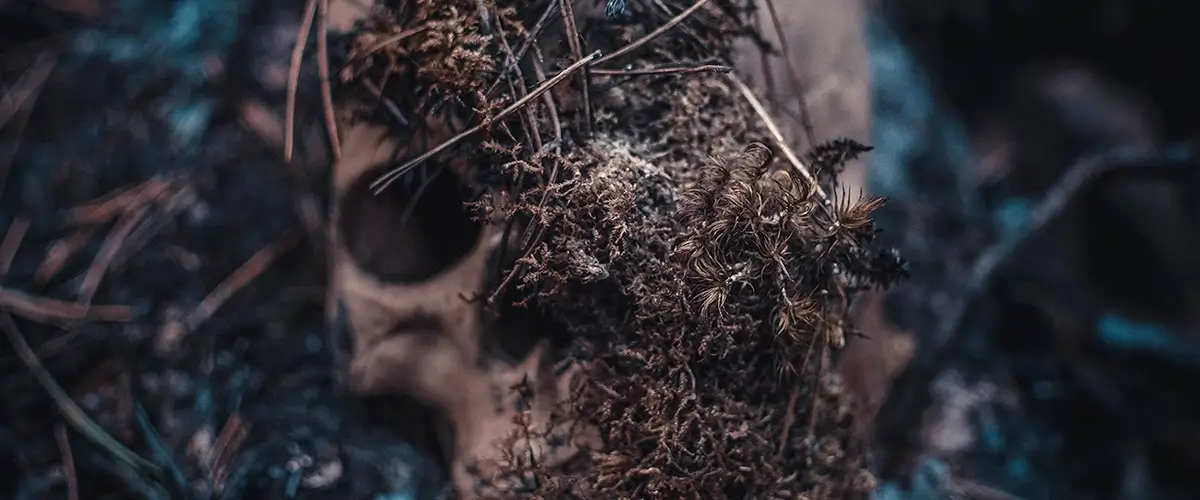Definition of human decomposition
Human decomposition refers to the process by which the physical structure of a human body breaks down after death. This process is natural and occurs as a result of the body’s tissues and organs breaking down due to bacterial activity and the actions of other decomposers such as insects and fungi.
The rate and extent of decomposition depend on several factors, including temperature, humidity, presence of insects, cause of death, and others.
The study of human decomposition is important in fields such as forensic science, where it can provide valuable information in criminal investigations, as well as in environmental and public health research.
What are the stages of human decomposition?
Human decomposition can be divided into several stages, which occur in a roughly predictable sequence. It’s important to note, though, that the timing and sequence of these stages can vary depending on environmental conditions, such as temperature and humidity, and other factors, such as the presence of insects and the cause of death.
Here are the main stages of human decomposition:
Fresh stage
This stage occurs within the first 12 hours after death and is characterised by the onset of rigor mortis, which is the stiffening of the muscles due to the chemical changes in the body. During this stage, the body is still pliable and the skin is warm to the touch.
Bloat stage
This stage occurs within 12-72 hours after death and is characterized by the build-up of gases produced by bacteria in the gut. During this stage, the body begins to swell and the skin may start to discolor.
Active decay stage
This stage occurs within 3-10 days after death and is characterized by the breakdown of tissues and the release of fluids. During this stage, the body continues to bloat and the skin may start to split and peel away.
Advanced decay stage
This stage occurs within 10 days to 4 weeks after death and is characterized by the liquefaction of tissues and the formation of bones. During this stage, the body continues to deteriorate and the bones may become visible.
Skeletal stage
This stage occurs after 4 weeks and is characterised by the drying out of the bones and the eventual reduction of the body to a skeletal structure.
What factors affect human decomposition?
Several factors can affect human decomposition. Each of these factors can interact with one another and can result in a wide range of outcomes in terms of the rate and extent of decomposition.
Understanding these factors is important for forensic investigation and for other fields that study human decomposition.
Environmental conditions:
Temperature, humidity, and rainfall can all influence the rate and extent of decomposition. Higher temperatures and higher humidity levels generally speed up the decomposition process, while lower temperatures and lower humidity levels can slow it down.
Time since death:
The length of time that has elapsed since death is a critical factor in decomposition. The longer the body has been dead, the further along the decomposition process will be.
Body position and posture:
The position and posture of the body after death can also affect decomposition. For example, bodies that are left lying flat on their backs tend to decompose faster than bodies that are lying on their sides or in a curled position.
Cause of death:
The cause of death can also play a role in decomposition. For example, a body that has died from a gunshot wound will decompose differently than a body that has died from a disease.
Personal factors:
Personal factors such as age, weight, and health can also influence decomposition. For example, older bodies tend to decompose more slowly than younger bodies, and overweight bodies tend to decompose more quickly.
Clothing and surrounding materials:
The type and amount of clothing and surrounding materials can also affect decomposition. For example, a body that is covered by heavy clothing or surrounded by materials such as concrete will decompose more slowly than a body that is left exposed to the elements.
Presence of insects:
The presence of insects, such as flies and beetles, can also have an impact on decomposition. Insects feed on the body and can speed up the decomposition process.
Chemical changes during decomposition
During human decomposition, several chemical changes occur as a result of the activities of bacteria, fungi, and other decomposers. Some of the most notable changes include:
- Putrefaction: This is the process of decay that results from the action of bacteria in the gut. The bacteria produce gases, such as methane and hydrogen sulfide, which cause the body to bloat and the skin to discolor.
- Hydrolysis: This is the process of breaking down proteins and other molecules into smaller components through the action of water. Hydrolysis occurs throughout the body and contributes to the breakdown of tissues.
- Lipid oxidation: This is the process of breaking down fats and oils in the body, which produces a range of by-products, including aldehydes and ketones. Lipid oxidation contributes to the breakdown of cells and tissues.
- Acidogenesis: This is the process of producing acids from the breakdown of sugars and other carbohydrates. Acidogenesis contributes to the formation of an acidic environment in the body, which further accelerates decomposition.
- Autolysis: This is the process of self-digestion that occurs when the body’s own digestive enzymes start to break down cells and tissues. Autolysis starts within hours of death and contributes to the overall decomposition process.
Each of these chemical processes contributes to the breakdown of the body’s tissues and organs and to the overall decomposition process. The interaction of these processes is complex and can result in a wide range of outcomes in terms of the rate and extent of decomposition.
The role of insects and fungi in human decomposition
Insects and fungi play important roles in the process of human decomposition. Certain species of insects, such as blowflies and flesh flies, are attracted to dead bodies and play a key role in the decomposition process.
They lay their eggs on the body, which then hatch into larvae that feed on the tissues. This feeding accelerates the decomposition process by breaking down tissues and speeding up the release of gases.
Insects also play a role in the transportation of decomposers from one body to another, which helps to distribute the decomposers and contributes to the overall decomposition process.
Certain species of fungi, such as molds and yeasts, are also attracted to dead bodies and play a role in decomposition. They feed on the tissues and contribute to the breakdown of tissues and the release of gases. Some species of fungi also play a role in the production of enzymes that break down complex compounds, such as cellulose, which speeds up the decomposition process.
Insects and fungi are important decomposers in nature and play a critical role in breaking down organic matter and recycling nutrients. In the context of human decomposition, they play a key role in the speed and extent of decomposition and contribute to the overall process of breaking down and recycling the body’s tissues and organs.
Human composition and society
Human decomposition has several implications for society, culture, religion, and the environment. These implications demonstrate the complex and multi-faceted nature of human decomposition and highlight the importance of understanding this process from multiple perspectives.
Societal implications
Decomposition can have significant societal implications, particularly in the context of death investigations and criminal cases. Understanding the processes of human decomposition and the factors that affect it is critical for forensic investigation, as it helps to determine the cause and time of death. Decomposition can also have implications for public health, as it can result in the release of harmful chemicals and pathogens into the environment.
Cultural and religious implications
Different cultures have different beliefs and practices related to death and the handling of dead bodies. In some cultures, there is a strong tradition of respecting the dead and treating the body with care, while in others, the handling of dead bodies may be more pragmatic or impersonal.
Some religions require that the body be buried in a specific way, while others prohibit cremation. Religious beliefs and practices can influence the way that decomposition is viewed and dealt with in society.
Decomposition can also have cultural implications in terms of burial and memorialisation practices, as well as beliefs about the afterlife and the fate of the soul after death.
Environmental implications
Human decomposition can have significant environmental implications, particularly in terms of the release of harmful chemicals and pathogens into the environment. The decomposition process can also result in the release of gases that contribute to climate change, and the handling of dead bodies can result in the use of resources, such as energy and materials, for funeral practices.

